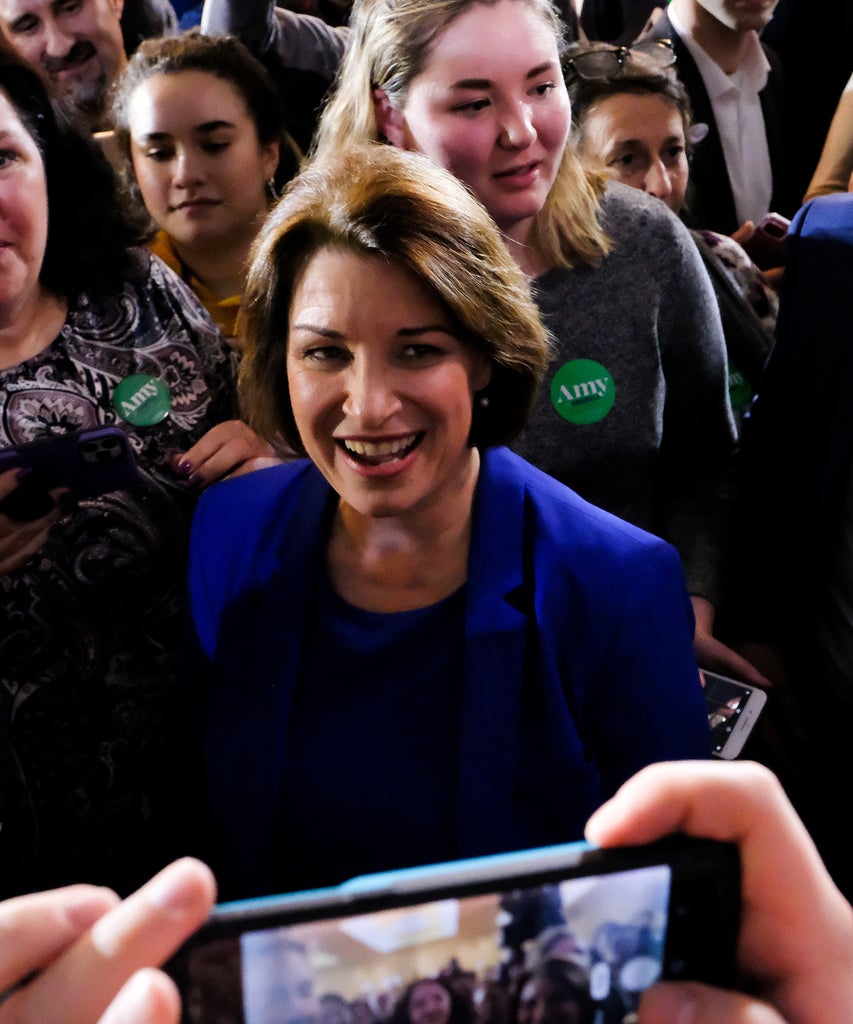
Sen. Amy Klobuchar made a speech on the evening of the New Hampshire primary that sounded very much like the speech of a winner, introducing herself to the country after a third-place finish in the first-in-the-nation contest. “Hello America!” she said to a raucous crowd chanting, “Amy! Amy! Amy!” “I’m Amy Klobuchar and I will beat Donald Trump. My heart is full tonight.”
After months of slow-and-steady-wins-the-race campaigning and polling in the single digits, Klobuchar rose to serious-contender status on Tuesday night. She came in behind Sen. Bernie Sanders and former South Bend, IN, Mayor Pete Buttigieg in votes and pledged delegates, but far outpaced crowd favorites Sen. Elizabeth Warren and former Vice President Joe Biden.
In her speech, Klobuchar made an important overture — not to Sanders and Buttigieg, running ahead of her, but to Warren. “As my friend, Elizabeth, noted earlier tonight, people told me, just like they told her, that they didn’t think a woman could be elected. In my case, it was elected to the U.S. Senate. No woman had ever done it before. But I came back, I defied expectations, and I won.”
As it was becoming clear that Warren was unlikely to win in New Hampshire, she also made a speech on Tuesday night, and also gave a boost to her fellow woman nominee. “Right now, it is clear that Sen. Sanders and Mayor Buttigieg had strong nights,” she said. “I also want to congratulate my friend and colleague Amy Klobuchar for showing just how wrong the pundits can be when they count a woman out.” Toward the end of the speech, she added, “Amy and I are the only candidates in this race who are not billionaires or supported by Super PACs.”
Klobuchar and Warren come from different ideological wings of the Democratic Party, and their unity on the eve of New Hampshire suggests that — just maybe — it’s women who can finally help the party overcome the divisiveness that’s grinding it into the ground. (Maybe The New York Times was onto something in its controversial double endorsement of Klobuchar and Warren after all.) Amid the growing contentiousness of the primary, it was a moment of solidarity among the only two women left in the presidential race.
Klobuchar’s surge was not a surprise to those who have been paying attention: After a disappointing fifth place in the Iowa caucuses, she’s been placing big bets on the small state of New Hampshire. Her moderate-Democrat ideas, such as opposition to Medicare for All (she tore into Sanders about it during the last debate) play well with what The New York Times called “the smaller-government tilt of plenty of Democrats in the state.” The fact that unaffiliated voters, or independents, are allowed to participate in the Democratic primary there surely helped Klobuchar.
Another reason you may have missed Klobuchar’s ascent: According to NBC exit polls, she particularly appealed to older voters, winning 32% of those 65 and older, compared to 19.8% of all voters.
She was also “favored among voters who say that the ability to unite the country is the most important quality they seek in a presidential candidate,” something that was reflected in her speech, which was at once emotional and let’s-get-to-work pragmatic. “If you want a Democratic nominee who can make our tent bigger, who can make our coalition wider, and our coattails longer, I know you and I will fight for you,” she said to applause.
In the speech, she appealed to people’s hearts more than she has in the past on the campaign trail, speaking about her struggles when her daughter Abigail was in intensive care as a newborn, and with her father’s alcoholism. “In his words, he was pursued by grace,” she said. “I believe that everyone in this country should have that opportunity to be pursued by grace.”
Klobuchar’s “unexpected” showing in New Hampshire is also real-life confirmation that 53% of voters are “very or extremely ready” for a woman president, as Lean In found in 2019. The problem, according to its research, is that only 16% of voters believe most Americans are “very ready” or “extremely ready” for a woman president, and 58% of voters think it will be harder for a woman to win.
At least on Tuesday, Klobuchar overcame many of these perceptions. But, despite her impressive fundraising after the New Hampshire surge, she has an uphill climb to prove that she’s the one in the upcoming primaries. She’s shown little strength with Black and Latinx voters, who are key to winning the key states of South Carolina and Nevada. On Super Tuesday, it may prove that she doesn’t have the name recognition she desires in big states like Texas and California.
But if there’s anything Klobuchar can do, it’s fight: Her campaign is reportedly aggressively expanding in those states. “I’m going to need the votes in South Carolina and beyond,” she said in her speech. “But most of all, I need your hearts. I don’t have that big bank account. I don’t have that big name as some of the other people that are in this race. And I am not a newcomer with no political record. But what I do is get things done.”
Like what you see? How about some more R29 goodness, right here?
Women Are Using Dating Apps To Campaign For Warren
Bernie Sanders Wins First New Hampshire Primary






